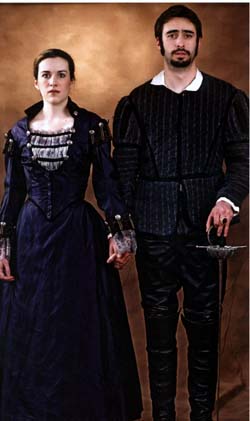Comedy, according to the old theatrical formulation, ends in marriage, which helps to explain the reputation of All’s Well That Ends Well as one of William Shakespeare’s “problem plays.”
Taking marriage as a mere starting point, All’s Well boasts a dark wit, a thematic complexity and a psychological acuity that turn typical romantic conventions on their heads.

In March and April, the Performing Arts Department in Arts & Sciences will celebrate the 400th anniversary of All’s Well That Ends Well with a two-weekend run at Edison Theatre. Performances will be at 8 p.m. March 28-29, 2 p.m. March 30, 8 p.m. April 4-5 and 2 p.m. April 6.
All’s Well tells the story of Helena (senior Laura Flanagan), the orphaned yet resourceful daughter of a famous physician. As a reward for healing the king of France (senior Nick Choksi), Helena is granted the husband of her choice and selects Bertram (junior Brian Golden), a dashing young nobleman somewhat above her social position.
Bertram consents to the wedding but, shortly thereafter, flees to Italy, declaring that he shall never be a true spouse until Helena obtains the family ring from his finger and becomes pregnant with his child. Yet Helena, still longing for the man she loves, determines to meet these seemingly impossible conditions.
“It’s a bit of a fairy tale, but it isn’t Cinderella,” said William Whitaker, PAD senior artist-in-residence, who directs the cast of 20. “Instead of perfect, pretty pictures, Shakespeare gives you all the messy, subjective, terrifying in-between stuff.
“It’s a strange journey, fraught from the beginning with betrayal and denial. At the finish, you wonder if things really have ended well.
“It’s a very human story,” he added. “Every time you think you have someone figured out, they do something to confound your expectations. As one of the soldiers says, ‘The web of our life is of a mingled yard, good and ill together.'”
Despite its famous title, All’s Well That Ends Well has a checkered production history and is seldom performed, especially in the United States.
Though some scholars ascribe this to the play’s aggressive heroine and un-sentimentalized (or even cynical) take on love, Whitaker said, “I think it has more to do with the convoluted dramaturgy, the twisting plot, the various, confusing rings the audience has to keep track of. It’s almost filmic, jump-cutting as if Shakespeare had thrown unity of time and place out the window.”
And so, “with great trepidation,” Whitaker trimmed the play by about a fifth, removing “the cryptic text that doesn’t drive the plot, the lines that seemed unplayable or material that would lead our audience astray.”
Fortunately, Whitaker has been able to rely on feedback from collaborators such as Tony Awardwinning actress Jane Lapotaire of Britain’s Royal Shakespeare Company, who is a distinguished visiting artist in the PAD.
“Jane’s been very helpful,” Whitaker said, both through her own readings and in preparing the cast for the intricacies of Shakespearean dialogue. “The distinctions between rhymed couplets and blank verse, how to play the prose — she’s teaching them to understand the text in really sophisticated ways and to handle it professionally.”
The production also features sophomore Daniel Hirsh as the braggart warrior Parolles, which Harold Bloom called one of Shakespeare’s greatest comic roles; senior Miriam White as the wise Countess; junior Janet Silverman as the kindly Widow; and sophomore Judith Lesser as the Widow’s virginal daughter Diane, whom Bertram attempts to seduce.
The set design, by senior Caitlin Lainoff, recreates elements of Shakespeare’s Globe Theatre in London (where the PAD sponsors an annual summer program).
Costumes are by Bonnie Kruger, senior artist-in-residence. Lighting is by Pete Gilchrist. Choreography is by Christine O’Neal, senior artist-in-residence and director of the Ballet Program. St. Louis actor Mike Monsey provided sword training.
Tickets are $12 — $8 for students, senior citizens and University faculty and staff — and are available at the Edison Theatre Box Office and through all MetroTix outlets. For more information, call 935-6543.